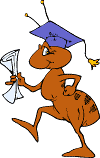Entomology, Department of

Department of Entomology: Dissertations, Theses, and Student Research
First Advisor
Judy Wu-Smart
Committee Members
Louise Lynch-O'Brien, Georgina Bingham, Autumn Smart
Date of this Version
5-1-2025
Document Type
Thesis
Citation
A thesis presented to the faculty of the Graduate College at the University of Nebraska in partial fulfillment of requirements for the degree of Master of Science
Major: Entomology
Under the supervision of Professor Judy Wu-Smart
Lincoln, Nebraska, May 1, 2025
Abstract
The European, or Western honey bee (Apis mellifera L.) plays a vital role in global ecosystems and agriculture, providing essential pollination services and producing valuable hive products. However, honey bee colony losses have escalated worldwide, but particularly across the United States due to various stressors, including biotic and abiotic factors, mismanagement, and environmental challenges. This thesis investigates key challenges in honey bee management and explores solutions aimed at improving colony health and productivity.
Chapter 1 provides an overview of the beekeeping industry, detailing its economic importance, services, and products, as well as the many challenges faced by beekeepers. It highlights the knowledge gaps in current management practices, underscoring the need for research-driven solutions.
Chapter 2 examines how the arrangement of combs or frames within a hive setup influences the installation success of bee packages, specifically comparing the commonly used commercial standard foundation frame with foundation frames that include an additional layer of natural beeswax (pre-waxed frames). The study shows that both the arrangement and type of frame can significantly affect how well a new colony settles and utilizes resources during the early stages of colony establishment, offering practical guidance for improving the success of package installations for new beekeepers.
Chapter 3 evaluates how colony population size affects winter clustering and investigates the impact of extreme winter weather on colony survival. In this experiment, I used modified frames—drilled with access or bypass holes—to reduce the distance bees must traverse across frames, aiming to determine whether these modifications facilitate easier movement and access to food stores during winter. This approach begins to explore whether improved resource access and mobility within the hive support clustering and influence winter survival, particularly in smaller, less populated colonies. The results indicate that colony strength, measured by the adult worker population, is the primary factor in winter survival. However, bypass frames can enhance thermoregulation and resource accessibility under harsh conditions by influencing clustering behavior and improving access to adjacent combs. These findings contribute to optimizing hive structure to boost colony performance and resilience.
Overall, my thesis underscores the importance of tailored management strategies to address the multifaceted challenges faced by honey bee colonies. More specially, Chapter 2 offers directly applicable knowledge for improving package installation success through practical adjustments in hive setup, providing immediate benefits for beekeepers. In contrast, Chapter 3 initiates a deeper investigation into the factors contributing to winter losses, laying the groundwork for future research aimed at better understanding and mitigating these critical challenges. By integrating scientific findings into both current practices and long-term inquiry, this research contributes to enhancing colony resilience and supporting sustainable beekeeping. These efforts are essential for reducing colony losses and ensuring the continued availability of the vital ecosystem services that honey bees provide.
Advisor: Judy Wu-Smart
Included in
Agricultural Science Commons, Entomology Commons, Terrestrial and Aquatic Ecology Commons


Comments
Copyright 2025, Shelby A. Kittle. Used by permission